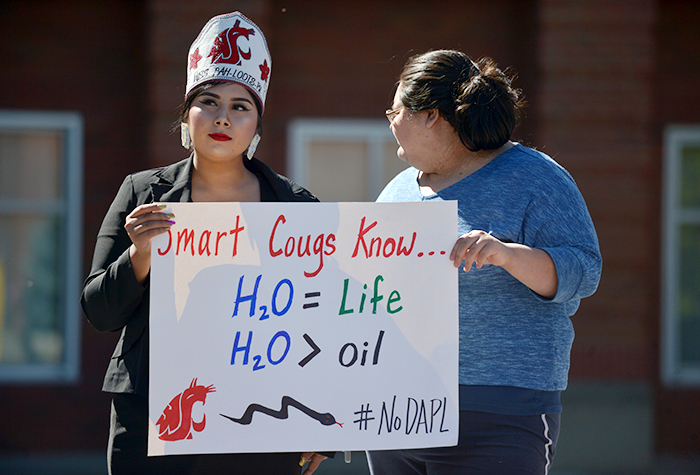Political apathy is dangerous to society
LUKE HOLLISTER | Daily Evergreen file
MyKel Johnson, left, and Samantha Reyes protest the Dakota Access Pipeline on Sept. 13, 2016 on the Todd Hall steps.
April 13, 2017
Throughout the course of American history, certain groups within society have enjoyed special rights and an elevated social status in comparison to group outsiders. We call those people privileged.
Privileged people are often white, wealthy, educated, heterosexual, able-bodied and male. However, a combination of any of those traits provides a person with certain levels of societal privilege. Because of these characteristics, privileged peoples’ voices and opinions are valued more heavily in society.
Faculty members are “more likely to respond to inquiries from prospective graduate students who are white males,” according to a study done by the Social Science Research Network in 2012.
What happens to all the women who don’t hold the same societal power as men? What about the ethnic minorities or the poor and uneducated? The current systematic discrimination in America silences these marginalized groups.
Frequently, marginalized people are targeted by exceedingly unfair laws, expectations and treatment. For instance, the potential Key Stone XL Pipeline construction across thousands of miles of Native American land – the legislation for the pipeline disregarded the concerns of indigenous people.
This is the ugly nature of privilege taking form in society. Those who have it often don’t know they benefit from it, while people who aren’t as privileged are ignored.
Chijioke Emeka, a junior majoring in basic medical sciences and Black Student Union president, said the issues we vote on affect many other communities.
“You should know who your decisions are affecting, and if [your decisions are] affecting them negatively or positively,” she said.
It’s so easy to become apathetic toward social justice or political issues if you are not a part of those groups. I cannot count the number of times I’ve heard the phrase “I don’t care” when it comes to political stances. Recently, a male acquaintance of mine told me he didn’t care about the federal defunding of Planned Parenthood because he is not a woman.
Perhaps some of the same people who say they don’t care can simply afford not to care. After all, societal privilege thrives on ignorant bliss. We perpetuate inequalities when we ignore them.
Paying attention to social justice issues is a matter of using your voice to benefit others. Members of white-majority groups can really aid those who have less privilege, Emeka said.
“Because they have such a strong voice they’re able to advocate and speak up for minority groups,” she said. “White silence is advocating for violence.”
Issues pertaining to minority groups arise at the local level. Privileged people can make an enormous difference when they advocate in their communities.
Earlier this year, a group of WSU professors used their valued academic reputations as members of the American Association of University Professors to support undocumented students in the hopes of creating a sanctuary campus.
“These goals are congruent with WSU’s goals of fostering integrity, trust, respect, diversity and global citizenship,” as stated in an article by WSU News.
It’s important to be knowledgeable about politics not only at the federal level, but also at the local level, because local government makes changes that affect our everyday lives, Emeka said.
“When you say you don’t care about politics, you are basically saying that you don’t care, or want to have a say in, things that directly affect you,” she said.
On a historical level, privileged groups subject minority groups to unjust treatment. But people in places of privilege can use their voices to better the lives of marginalized people. One example of this is the abolitionist movement.
It is important to care about social justice issues even if they don’t pertain to groups you belong to, simply on the basis of empathy. The political choices we make directly affect other people whether we see it or not.
Geana Javier is a sophomore economics major from Seattle. She can be contacted at 335-2290 or by [email protected]. The opinions expressed in this column are not necessarily those of the staff of The Daily Evergreen or those of The Office of Student Media.









